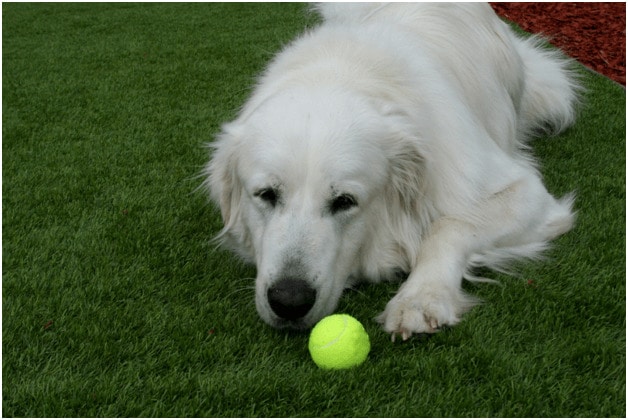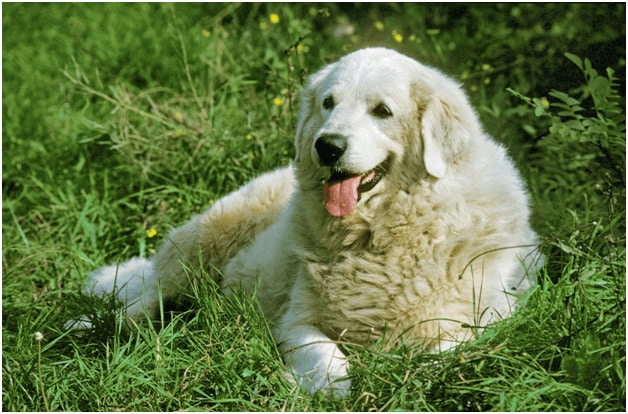Every dog owner knows that they have to protect their furniture and other things around the house because dogs have a habit of chewing things. Some giant breeds tend to chew more aggressively than others. We are going to look at the Great Pyrenees and whether they are big chewers.
While some Great Pyrenees dogs love to chew on things, others don’t seem to be interested in it at all. If your dog loves to chew, this could be because they are anxious or stressed, or feeling pain. Other reasons include being bored and not having chew toys available.
We decided to explore the various reasons why some Great Pyrenees are major chewers and share some practical tips to minimize this behavior.
Why Are Great Pyrenees Chewers?
There are various reasons Great Pyrenees have chewing problems. We explore these below:
They Don’t Understand What Acceptable Behavior Is
Just like babies, these adorable puppies explore the world around them by chewing on everything they can get their adult teeth on.
This is perfectly normal behavior and usually stops once they reach about 12 months of age. It’s important to provide your puppy with lots of appropriate chew toys so they can safely satisfy their chewing needs.
They Don’t Have Appropriate Chew Toys Available
When no chew toys are available, your dog will often chew on things that aren’t made to be chewed, such as furniture or shoes. Your dog should have safe and durable adult toys handy around the home. This will distract them from chewing on inappropriate items.
Check out the Great Pyrenees with his chew toy below:
They Are Bored and Need to Occupy Themselves
When the Great Pyrenees is left alone for long periods of time, they can chew out of boredom. They should have a lot of toys and activities to keep them occupied, such as adult toys, bones, puzzle toys, and interactive toys.
They Are Feeling Anxious or Stressed

Some Great Pyrenees become chewers when they are feeling anxious or stressed. This is usually a way for them to release their energy and calm down.
If your dog is chewing because of anxiety or stress, you may need to work on solving the underlying issue. There are many ways to help an anxious dog, so be sure to talk to your veterinarian for advice.
Don’t miss – The Ultimate Great Pyrenees Guide – All Questions Answered!
They Are Experiencing Fear or Pain
Dogs that are in pain or afraid may start chewing as a way to cope with their fear or pain.
If you speculate that your dog is chewing because of fear or pain, be sure to talk to your veterinarian right away. They can identify the cause of the problem and provide treatment options.
Chewing Makes Them Feel Safe and Secure
Some dogs chew because it makes them feel safe and secure. This is often the case with puppies who are teething.
Chewing on something helps to soothe their gums and provide relief from the pain of teething.
Are Great Pyrenees Aggressive Chewers?
Well, it depends on each individual dog. Some Great Pyrenees are more destructive chewers than others. If the dog you have is an aggressive chewer, you need to provide them with plenty of appropriate toys and bones to keep them occupied.
If you catch them chewing on items around the home, focus on redirecting their attention with their favorite toy or bone.
How to Manage the Bad Behavior of Great Pyrenees Chewing?
If your dog is chewing on things that it shouldn’t be, there are a few things you can do to manage the destructive behavior.
First, make sure they have plenty of appropriate chew toys available.
This will help to keep them occupied and prevent them from chewing on inappropriate items. You can also try using a bitter spray or deterrent gel on items that you don’t want them to chew.
What Natural Remedies are available?
There are a few natural remedies that you can try to help your dog with its urge to chew. One is to give them a frozen washcloth or ice cube to chew on.
This will help soothe their gums and provide relief from the pain of teething.
You can also try giving them a play toy specifically designed for chewing. This will help deter them from chewing on items that shouldn’t be chewed on!
Will A Chew Bone Help?
Yes, a chew bone can help your dog stop chewing on other things. Chew bones are specifically designed for dogs to chew on, so they will help keep your dog busy and stop them from chewing on inappropriate items.
Why Can’t I Give My Dog A Rawhide Instead of Having Them Chew on Furniture?
Rawhides can be a good option for dogs that like to chew, but they can also be a choking hazard.
If you give your dog rawhide, be sure to supervise them while they are chewing it.
You should also avoid giving them any type of bone that could splinter and cause internal injuries. Chew bones are a safer option for dogs, and they are specifically designed to be chewed on.
What about Flavored Dental Chews?
Flavored dental chews can be a good option for dogs that like to chew. They help clean your dog’s teeth and provide them with some additional flavor.
Why Are Great Pyrenees So Bad at Chewing?
The Great Pyrenees may be bad chewers for a variety of reasons, including boredom, anxiety, teething pain, or lack of appropriate chew toys.
If the dog is having trouble with its chewing, you may need to work on solving the underlying issue.
How to Prevent my Dog Chewing When I’m Not Around?

If you are not able to supervise your dog at all times, you may need to use a deterrent gel or spray to keep them from chewing on inappropriate items.
These products contain ingredients that taste unpleasant to dogs, so they will help deter your dog from chewing on those items. You can also try using a chew bone or toy specifically designed for chewing.
Finally, make sure that you are providing your dog with plenty of exercise and mental stimulation. A tired dog is a good dog!
How to Reduce This Type of Behavior?
Certain steps can reduce this type of behavior. You can try using a chew bone or toy specifically designed for chewing. These products will help keep your dog occupied and prevent them from chewing on inappropriate items.
As outlined earlier, the use of a bitter spray or deterrent gel on items that you don’t want them to chew is often effective.
These products contain ingredients that taste unpleasant to dogs, so they will help deter your dog from chewing on those items.
Final Thoughts
The Great Pyrenees can be big chewers, so early intervention is needed to break this behavior.
Chewing is a common and natural behavior for most dogs and can often be difficult to manage.
However, with patience and some simple tricks, you can help your dog stop chewing on inappropriate items.
Provide your dog with plenty of exercise and mental stimulation, and redirect their attention with a chew bone or toy specifically designed for chewing.


